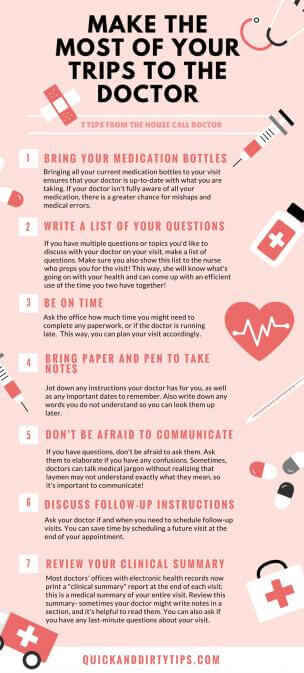7 Tips to Make the Most of Your Visits to the Doctor
Learn 7 tips that will help you take charge of your health during your visits to the doctor.

“He didn’t listen to what I was trying to tell him.”
“She was in and out in less than 5 minutes.”
“I didn’t understand what I was supposed to do by the end of the visit.”
“She used words I really just didn’t understand.”
I sadly hear these pleas of help all too often. But when it gets down to the bottom line, doctors do simply want the best for their patients—but perhaps they may not realize that patients need more explanation and more medical jargon translation. And patients may not realize that doctors run a very tight schedule and need to thrive on efficiency to make it through the day. These two sides may clash on occasion, Regal Beagle style. I’ve discussed some of these issues in my previous podcasts, and a few have gone officially “viral” on the internet, perhaps due to some of the common-ground controversy that patients and doctors share:
Why is My Doctor Always Late?
Why Can’t My Doctor Spend More Time With Me?
How to Spend Less Time Waiting for the Doctor
Although not every doctor-patient relationship will be perfect (just like any other relationship), I can suggest some tips for patients to make the most of your doctors’ visits.
 7 Tips to Take Charge of Your Doctors’ Visits
7 Tips to Take Charge of Your Doctors’ Visits
Like every relationship, it takes some compromise and hard work to create a solid foundation. And if you find a doctor that you deem worthy enough to form a relationship with, then here are some suggestions on how you can take charge of your relationship and office visits:
-
1. Reveal your baggage:
Bring your medication bottles. If you don’t have your medication list memorized, please bring all of your bottles with you to every visit. I cannot stress the importance of this step enough. Your doctor may have an electronic list of your medications, but if you’ve made changes with the specialist or have stopped/started a new drug that she doesn’t know about, there’s a great chance for mishaps and medical error. So, unless you are on top of all the medications you are taking, the dosages, how many times a day, and are aware exactly what you are prescribed a medication for, it is extremely wise to bring all your bottles to your visits. Also, if your doctor wants to make changes to your medications, they can simply point out the bottle that requires alterations. -
2. Prepare for your dates:
Bring a written list of questions. If you have more than 1-2 non-related medical issues (like for example, “I want to discuss my blood pressures,” “I’m having back pain,” and “I need a work excuse note for today”), write them down and show them not only to the nurse who measures your vital signs and escorts you to the exam room, but also to your doctor at the very beginning of your visit. This way, even if she cannot address every single issue on your list, she can get an idea of what is going on in your health and how to best use the time you have together for the visit. -
3. Don’t stand them up:
Be on time for your appointments. Before your visit, ask the office when the most ideal time to arrive for your visit is—that is, is it 5 minutes or 15 minutes before? Will there be paperwork to complete before the visit? If the doctor is running late, how can you best learn so before the visit that day? Patients that do run late ultimately may delay other appointments for both the doctor and patients that day, as in a domino effect. -
4. Keep a relationship diary:
Bring paper and pen. Take notes during your visit with the doctor. Write down when they want you to go to the lab the next time. Jot down their instructions for how to increase your medication dose or when to call if you are not better. Make certain you understand what the “plan” for your ailment really is. Write down any words you may not understand because your doctor may take for granted some medical jargon that is not so easy to understand for others. -
5. Communicate:
Don’t be afraid to ask questions. If you don’t understand a medical term, don’t be afraid to ask your doctor to elaborate. When your doctor tells you that you have “microalbuminuria,” it may seem intuitive to him, but unless you speak up and ask what that is, it may not even occur to him that not everyone understands what that intimidating term truly means. Doctors are not all excellent teachers, unfortunately, and may simply forget that not everyone understands what they are trying to say. -
6. Find out when you should “call”:
Discuss follow-up instructions. Even though it may not be wise in your other relationships to ask this question, it’s super smart to ask this of your doctor. By the end of your visit, ask your doctor when to schedule (if needed) any follow-up visits. When should you see your doctor again? No, I don’t mean at the next golfing match (please, that’s so cliché). That is, when should this next follow-up visit ideally occur, or is it even necessary? -
7. Reflect on your encounter:
Read and study your “clinical summary.” Most doctors’ offices with electronic health records now dispense a printout of your “clinical summary” at the very end of your visit. This is a medical summary of your entire visit—please review this in detail. Sometimes, doctors write patient instructions on this summary, so make sure you understand which section includes notes from your doctor. The summary often also includes your vital signs (blood pressure, heart rate, weight, etc.), in addition to your diagnoses and prescriptions. Make certain that you understand everything on this summary, and if you don’t, ask.
OK, OK. So, given my above tips, it’s obvious that I’m not a dating expert. Either that, or perhaps it’s simply that your relationship with your doctor may not be the most typical relationship. But my goal is really to inspire your visits to run more smoothly and ultimately help you take charge of your health.
With all that being said…
Come and knock on our (office) door,
We’ve been waiting for you.
Share your ideas and learn more Quick and Dirty Tips with us on the House Call Doctor’s Facebook and Twitter pages. You can even find me on Pinterest!
Please note that all content here is strictly for informational purposes only. This content does not substitute any medical advice, and does not replace any medical judgment or reasoning by your own personal health provider. Please always seek a licensed physician in your area regarding all health related questions and issues.
Doctor patient image courtesy of Shutterstock.


 7 Tips to Take Charge of Your Doctors’ Visits
7 Tips to Take Charge of Your Doctors’ Visits



